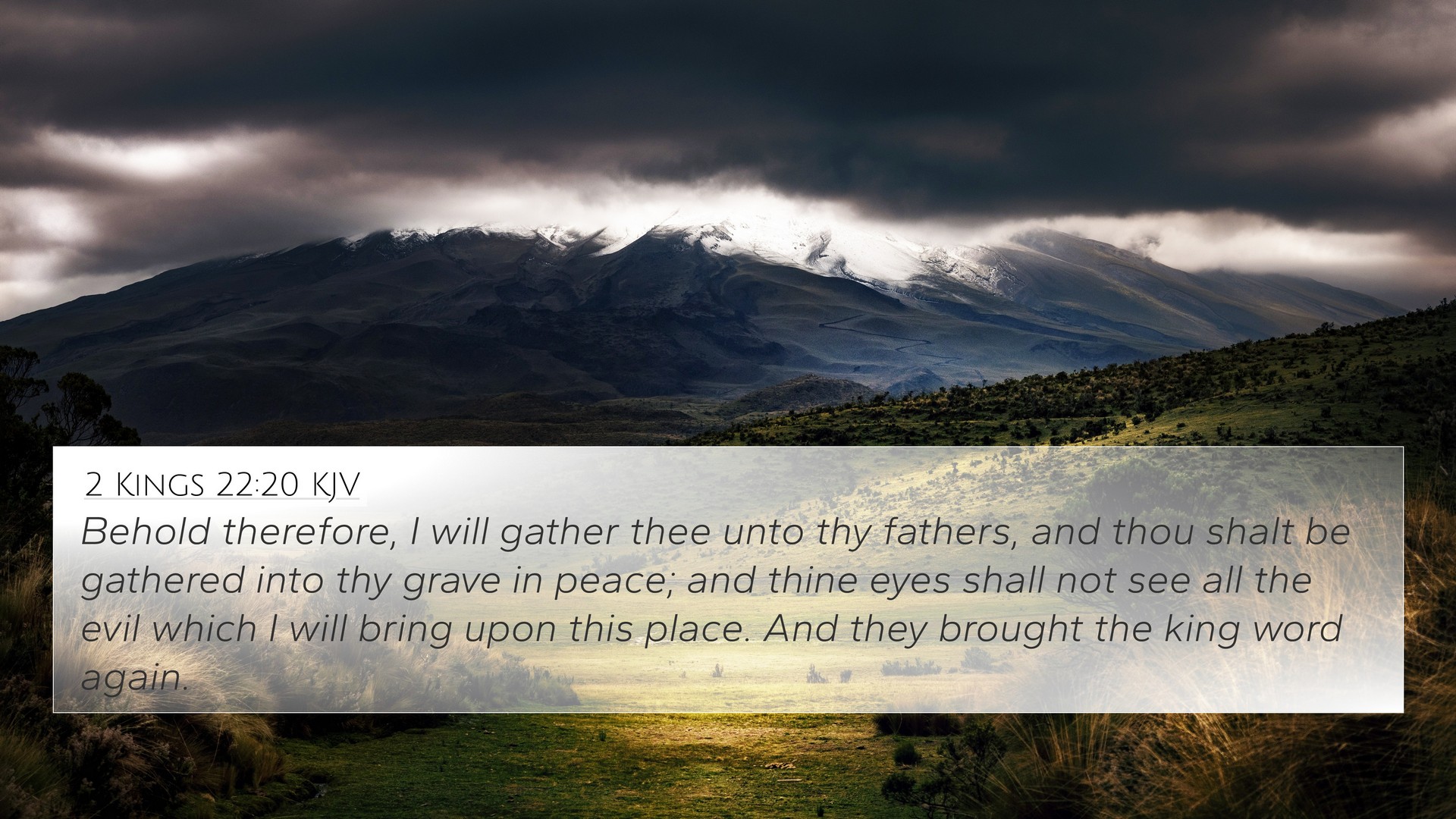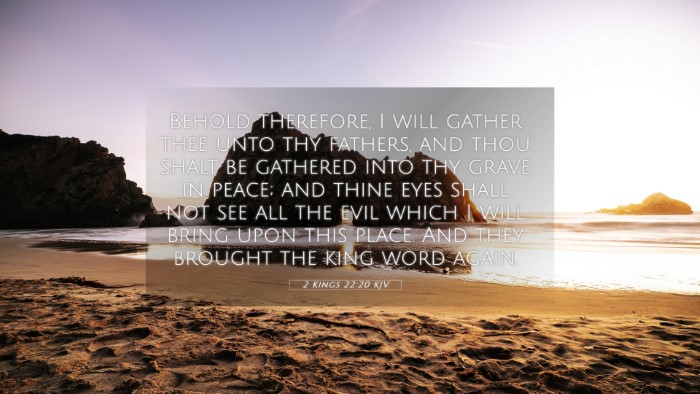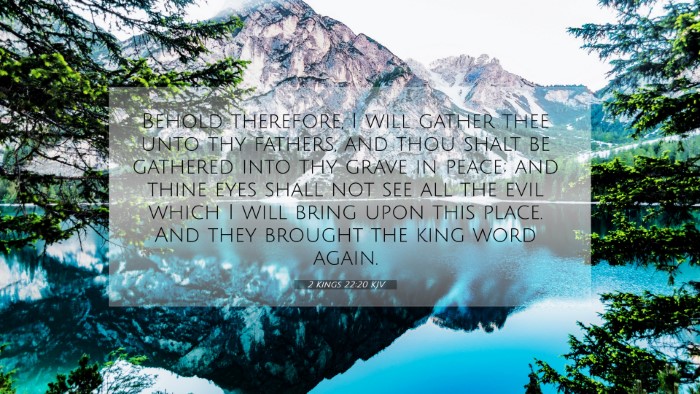Old Testament
Genesis Exodus Leviticus Numbers Deuteronomy Joshua Judges Ruth 1 Samuel 2 Samuel 1 Kings 2 Kings 1 Chronicles 2 Chronicles Ezra Nehemiah Esther Job Psalms Proverbs Ecclesiastes Song of Solomon Isaiah Jeremiah Lamentations Ezekiel Daniel Hosea Joel Amos Obadiah Jonah Micah Nahum Habakkuk Zephaniah Haggai Zechariah Malachi2 Kings 22:20 Similar Verses
2 Kings 22:20 Cross References
Behold therefore, I will gather thee unto thy fathers, and thou shalt be gathered into thy grave in peace; and thine eyes shall not see all the evil which I will bring upon this place. And they brought the king word again.
Uncover the Rich Themes and Topics of This Bible Verse
Listed below are the Bible themes associated with 2 Kings 22:20. We invite you to explore each theme to gain deeper insights into the Scriptures.
2 Kings 22:20 Cross Reference Verses
This section features a detailed cross-reference designed to enrich your understanding of the Scriptures. Below, you will find carefully selected verses that echo the themes and teachings related to 2 Kings 22:20 KJV. Click on any image to explore detailed analyses of related Bible verses and uncover deeper theological insights.
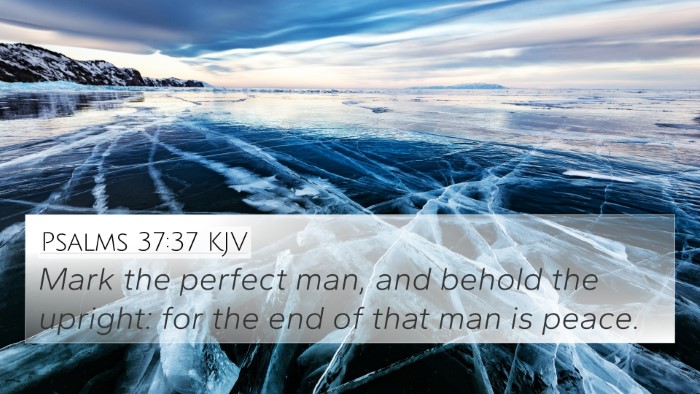
Psalms 37:37 (KJV) »
Mark the perfect man, and behold the upright: for the end of that man is peace.
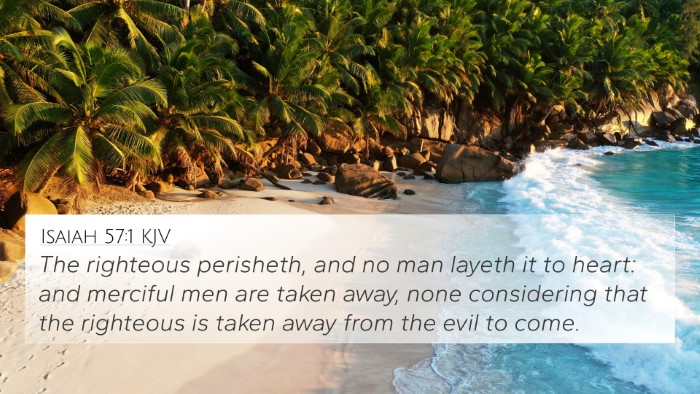
Isaiah 57:1 (KJV) »
The righteous perisheth, and no man layeth it to heart: and merciful men are taken away, none considering that the righteous is taken away from the evil to come.
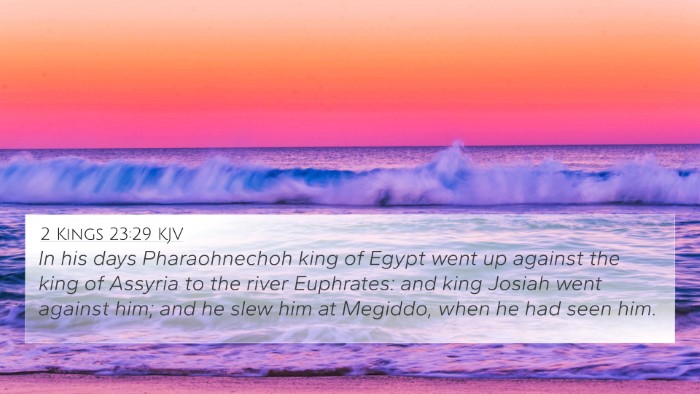
2 Kings 23:29 (KJV) »
In his days Pharaohnechoh king of Egypt went up against the king of Assyria to the river Euphrates: and king Josiah went against him; and he slew him at Megiddo, when he had seen him.

1 Chronicles 17:11 (KJV) »
And it shall come to pass, when thy days be expired that thou must go to be with thy fathers, that I will raise up thy seed after thee, which shall be of thy sons; and I will establish his kingdom.
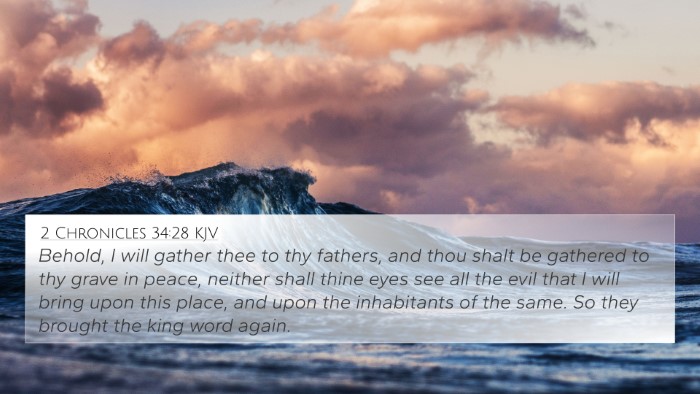
2 Chronicles 34:28 (KJV) »
Behold, I will gather thee to thy fathers, and thou shalt be gathered to thy grave in peace, neither shall thine eyes see all the evil that I will bring upon this place, and upon the inhabitants of the same. So they brought the king word again.
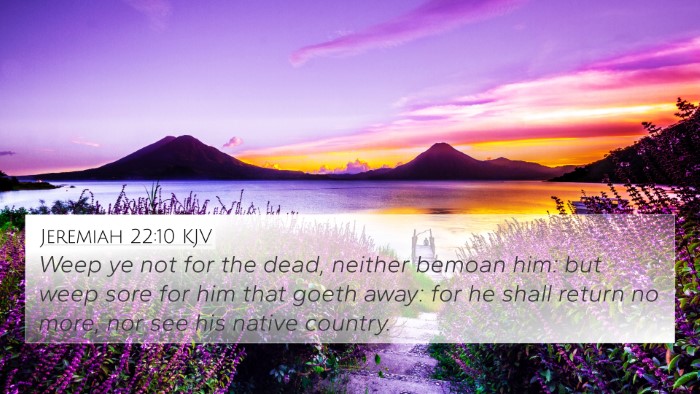
Jeremiah 22:10 (KJV) »
Weep ye not for the dead, neither bemoan him: but weep sore for him that goeth away: for he shall return no more, nor see his native country.
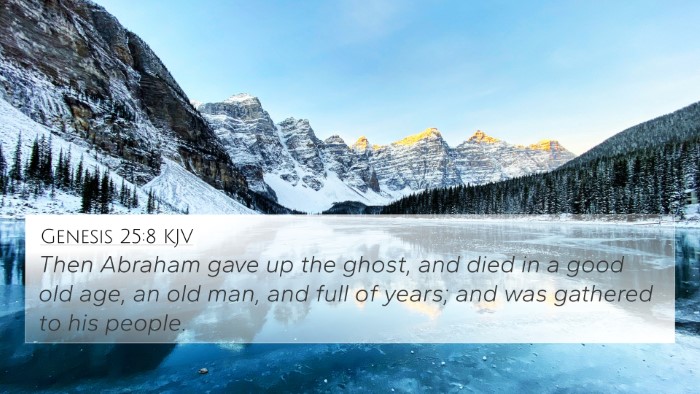
Genesis 25:8 (KJV) »
Then Abraham gave up the ghost, and died in a good old age, an old man, and full of years; and was gathered to his people.
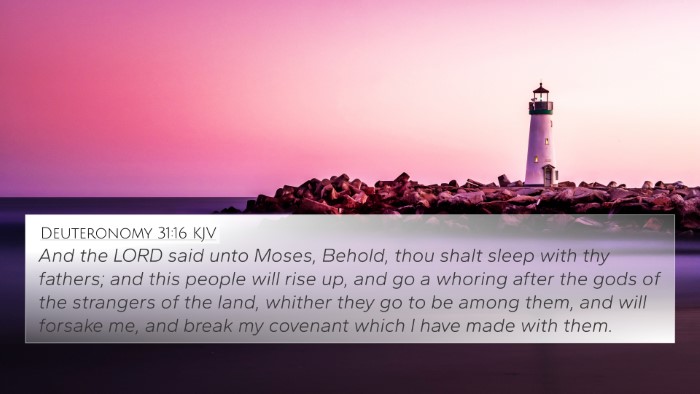
Deuteronomy 31:16 (KJV) »
And the LORD said unto Moses, Behold, thou shalt sleep with thy fathers; and this people will rise up, and go a whoring after the gods of the strangers of the land, whither they go to be among them, and will forsake me, and break my covenant which I have made with them.
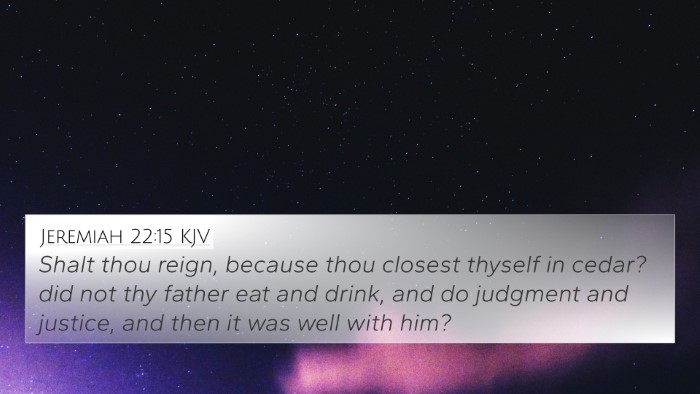
Jeremiah 22:15 (KJV) »
Shalt thou reign, because thou closest thyself in cedar? did not thy father eat and drink, and do judgment and justice, and then it was well with him?
2 Kings 22:20 Verse Analysis and Similar Verses
Understanding 2 Kings 22:20
Verse: 2 Kings 22:20 - "Therefore I will gather you to your fathers, and you shall be gathered to your grave in peace; and your eyes shall not see all the calamity that I will bring upon this place.”
Meaning and Interpretation
The verse from 2 Kings 22:20 concludes a significant prophetic message delivered to King Josiah regarding the impending judgments upon Judah due to its sins. Through the lens of several public domain commentaries, we gain a multifaceted understanding of this scripture.
Context of 2 Kings 22
In this chapter, King Josiah, who reigned in Judah, leads a religious reform after discovering the Book of the Law. His zeal for restoring true worship prompts him to seek God’s counsel, and he sends the high priest to inquire of the Lord through the prophetess Huldah.
Key Insights from Commentaries
- Matthew Henry: Henry emphasizes the grace and mercy shown to Josiah, noting that his faithfulness and sincere heart led God to assure him peace during his reign, despite the future calamity awaiting Judah. Josiah’s personal righteousness serves to highlight the profound nature of divine judgment and mercy.
- Albert Barnes: Barnes draws attention to the prophetic nature of Huldah’s words, suggesting that while future destruction is inevitable, God allows Josiah to escape the immediate consequences due to his devotion and repentance. This illustrates a key biblical theme: individual faithfulness can lead to personal peace, even amidst widespread turmoil.
- Adam Clarke: Clarke interprets this verse in the context of both judgment and consolation. He notes that God’s justice does not negate His mercy, showcasing the duality in divine dealings. Josiah's death before the calamities serves as God’s compassionate response to his loyalty.
Theological Themes
- Divine Mercy: This verse exemplifies God’s mercy and grace bestowed upon those who seek Him. Josiah, as a reformer, gains reprieve from suffering God's wrath.
- Judgment and Hope: While judgment is pronounced, hope is illustrated through Josiah’s peaceful death. It reflects God's intimate involvement in the affairs of humanity.
- Righteousness and Consequences: Josiah’s righteousness provides a stark contrast to Judah’s unfaithfulness, emphasizing that personal faith can influence one’s fate, independent of collective guilt.
Cross-References to 2 Kings 22:20
- 2 Chronicles 34:28: A parallel passage affirming Josiah’s peaceful death and God's promise regarding the inevitable judgment.
- Jeremiah 22:10: Addresses the mourning for dead kings, resonating with the theme of peace after death.
- Isaiah 57:1-2: Discusses the righteous being taken away from evil, similar to Josiah's fate.
- 1 Kings 14:13: Relates to the protection of a righteous offspring amidst judgment directed towards a corrupt lineage.
- Ezekiel 18:30: Highlights the call to repentance and its consequences, connecting to Josiah's actions.
- Psalms 37:37: Advises observing the righteous and the end of the upright, echoing the peaceful end of Josiah.
- Revelation 14:13: Celebrates those who die in the Lord, linking faithfulness with eternal peace.
Searching for Cross-References
For those interested in exploring Bible verse cross-references, this verse provides a launchpad. It invites a comparative Bible verse analysis linking it with various texts that discuss judgment, mercy, and the fate of the righteous.
Tools and Resources for Cross-Referencing
- Bible Concordance: Essential for finding thematic connections and biblical parallels.
- Bible Cross-Reference Guide: Useful for identifying scriptures that interrelate with 2 Kings 22:20.
- Cross-Referencing Bible Study Methods: Recommended for deeper insights into biblical themes.
- Bible Chain References: A system that facilitates the investigation of related verses effectively.
Conclusion
This verse serves as a poignant reminder of the balance between God’s judgment and mercy. Josiah’s experience underscores the truth that while divine judgment comes as a consequence of collective sin, individual faithfulness can provide solace and peace. The cross-references enrich this understanding, allowing for a comprehensive exploration of the connections between Bible verses.
Further Study Suggestions
For individuals interested in diving deeper into the connections between Old and New Testament themes, consider exploring the inter-Biblical dialogue between prophetic literature and the teachings of Jesus. This offers a valuable perspective on how scriptural cross-referencing enhances our understanding of the entirety of God’s word.
Engagement with Others
Join a community study group focused on Bible cross-referencing to collaboratively explore related scriptures and their applicability to daily life. Such collaboration aids in understanding the thematic connections found throughout the Bible and encourages deeper engagement with Scripture.
